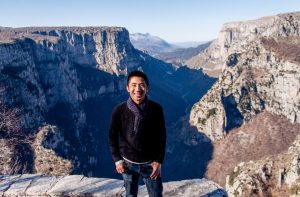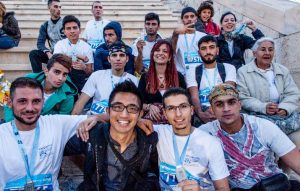Written by Steven Tagle, Fulbright US Student to Greece 2016-17

At Mytikas, the highest peak of Mount Olympus, with Josh Arnold, an American friend I made on the way up
When I describe my year in Greece, I often feel like I’m describing a place I imagined rather than a place that actually exists. It is a place where golden light strikes marble columns and sparkles over the wine-dark sea; where rowdy, curious, and clever characters drink and dance; where tradition and innovation, creativity, and chaos brew in a social and economic cauldron. As a fiction writer with an admittedly tenuous grip on reality, I’ve inhabited Greece the way a reader inhabits a book. “Reading” Greece this year has reawakened my senses and bound me to Greek and Syrian people whose mythic stories have challenged what I thought I knew about the crises, and what I thought I knew about myself. I may be the newest reader of a book that spans millennia, but like Byron, Fermor, and Merrill, I’ve found a home in this country and hope to contribute to its pages.

The Vikos Gorge from the Beloi Lookout in Vradeto, supposedly the deepest gorge in Europe.
I came to Greece through its mythology, intrigued by a people whose gods were as raucous, petty, and vindictive as they were noble and just. The landscapes of Greece retain the mystery and power of mythology. Thanks to Fulbright, I’ve visited many of these places, where our world still seems to touch the world of the gods. I’ve walked along the Acheron River – the “River of Woe” – whose spectral blue waters seem colored by the spirits of the dead. I’ve listened for prophecy in the rustling oak leaves at Dodona and felt stalactites drip onto the back of my neck as a silent boatman ferried me through the caves at Diros. I’ve retraced Odysseus’s homeward path through the Ionian Islands and paid tribute to monsters Hercules had slain in the Peloponnese. Some days, traveling alone and outside my comfort zone, I walked on the edge of fear, knowing that beyond fear is awe, or δέος, the proper attitude for approaching the gods.
I saw δέος on a Naoussan boy’s face during Carnival when he put on the wax mask of the γενίτσαρος for the very first time. I learned to play Trex in UNHCR hotels and befriended an amorous Iraqi who had lost his legs as a child. My students at Aristotle University of Thessaloniki shared their yiayias’ spoon sweets and their own stories of first love, of coming out, of overcoming anxiety, of living with HIV. I visited their hometowns, stations of my Syrian friends’ wayward journeys. I know which cheeses each island produces and for which dessert each village is famous. Everyone I’ve met breathes a bit of Greece into me, and their life stories take root in my imagination. Now initiated into Greek culture, I’m eager to soak up every bit of history and myth, new local food, new tradition.

At Kallimarmaro Stadium with the Solidarity Now team, the first refugee team to run in the Athens Marathon.
A monk on Mount Athos gave me this advice: To write distinctly, live distinctly. In Greece I learned a different way to live. I’ve always held myself apart from people, but here, I was expected to spill into other people’s lives, to reach over them for food, to let myself need and be needed by them. Friends who have visited me in Greece say that I speak louder in Greek, that I’m more willing to talk to strangers, more willing to ask for help. They notice how Greek people open up to me when I speak the language. When a Greek asks me if I’m part Greek, I respond, Ναι, η καρδιά μου είναι ελληνική, “Yes, my heart is Greek.” Completing my Fulbright year is a bittersweet accomplishment, like coming to the of a beloved book. But as Greece has become part of me, so has my experience become part of the story of Greece.


2 Comments
The next step of course is to formalize your being Greek. I appl;ied for citizenship on the basis that I feel Greek and it worked
What wonderful people and how lucky you are to have found Greece so soon in your life
That was a beautiful story, I feel very happy for you.